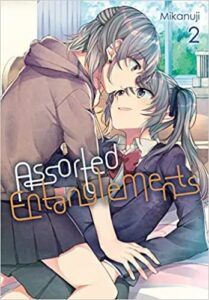 Matt Marcus is a cohost of various projects on the Pitch Drop Podcast Network, as well as the writer for the blog Oh My God, They Were Bandmates analyzing the manga series How Do We Relationship.
Matt Marcus is a cohost of various projects on the Pitch Drop Podcast Network, as well as the writer for the blog Oh My God, They Were Bandmates analyzing the manga series How Do We Relationship.
In Assorted Entanglements volume 1, OL dirtbag Iori drunkenly hooks up with a delinquent with a heart of gold, Minami, and the two begin dating thereafter. Also in the mix is Iori’s yandere siscon younger sister Shiori and Minami’s old juvvie friend Shizuku, both of whom are problematic in their own ways which means they make prime secondary ’ship material, I guess.
Before I dive into Assorted Entanglements, volume 2, I do want to go on a Brief Rant about the series generally. I feel that the series has a very conflicting, and dare I say irresponsible, approach to the topic of violence. This is a series where two of the main characters have suffered through traumatic childhood abuse, who both end up in pairings with partners who physically abuse them–but this time, it’s for comedy! I can understand what Mikanuji is going for, which is the role reversal of these two Bad Girls™ who end up dominated by two “normie” ones, but the tonal whiplash leaves an awful taste in my mouth. When Minami’s coworkers see her bruised face and say “you should leave your partner”, I go yeah, actually. What’s worse is that the most common cause of Iori’s violence are times when Minami is expressing how little she values herself, which is a result of the abuse she suffered from her parents. The whole conceit becomes very difficult to stomach the second you put any thought into it.
What’s probably best about this volume is that a good chunk of it is not dedicated to Minami and Iori. A new couple is introduced: the mangaka Heke-sensei and her editor, Shinohara. Professionally, they’re in constant friction, but they get along swimmingly when they play online games together while hiding behind their gaming handles. It’s a tad contrived, sure, but it’s a nice panacea to the grimey undertones that haunt our previously established couplings (also props for making this scenario not a coincidence). The way Mikanuji ties their story into the broader picture is one of the most hilariously paper-thin excuses, which is that Iori and Shinohara are old college friends. Of course, neither admit to each other that their love lives involve other women. So it goes.
What we do see of Minami and Iori is still the mixed bag of good sexual chemistry, some warm tenderness, and the occasional smack across the jaw. We get a glimpse into what led to Minami landing in the detention center and hoo boy, is it a doozy (thankfully it is only described, not shown). Meanwhile, Shiori and Shizuku’s relationship continues to develop. They are both so terrible, they deserve each other.
Mikanuji’s art is attractive to look at but it does suffer from the worst case of Same Face Syndrome that I have ever seen. The delinquent characters have an aesthetic that I dig–lots of piercings and tattoos, funky hairstyles–but I find it really difficult to tell apart any of Minami’s or Shinohara’s coworkers. Another odd habit of the art is how Mikanuji often completely skips bouts of action between panels which often leads to a disjointed flow when reading. The most egregious example is when Shiori breaks into Shizuku’s apartment by smashing a window: in one panel, we see Shizuku’s face with a small crash sound effect hiding in the corner, and in the next panel Shiori is standing in the room holding a rock with glass on the floor. Mikanuji is not incapable of drawing action–see Shizuku’s punch in volume 1–but they have a habit of not drawing it when the action is meant to drive a joke, such as the countless times Iori has punched Minami in the face between panels (no I will not let this go, it happens a lot).
The thing that keeps bringing me back to this series is that when a joke lands, it lands well. The way Minami texts with Shizuku? The weird phone charm that Shiori is interested in? The argument between Iori and Minami on who should top? All good gags. I would credit translator Eleanor Ruth Summers with keeping the dialogue snappy. When the characters are bouncing off of each other with things other than their fists, it’s a pretty good time.
Art – 7 I like it, but the craft of it could use some improvement
Story – 7 Better than volume 1 but the violence issue still persists
Characters – 7 Every character has their moments of likability. Yes, even Shizuku
Service – 4 Iori and Minami still go at it from time to time
Yuri – 8 / LGBTQ – 6 This is the first time I’ve seen “pillow princess” used in a manga, so that’s neat
Overall – 7 I’m still willing to play a round or two
Don’t involve your children in your crimes, but if you must, at least make it a fun crime


